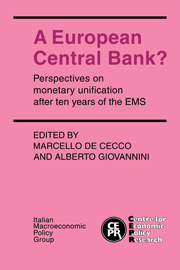Book contents
- Frontmatter
- Contents
- List of figures
- List of tables
- Preface
- List of conference participants
- 1 Does Europe need its own central bank?
- 2 Monetary policy, capital controls and seigniorage in an open economy
- 3 Seigniorage in Europe
- 4 Factor mobility, uncertainty and exchange rate regimes
- 5 Management of a common currency
- 6 The tastes of European central bankers
- 7 The costs and benefits of a European currency
- 8 The monetary unification process in nineteenth-century Germany: relevance and lessons for Europe today
- 9 The establishment of a central bank: Italy in the nineteenth century
- 10 The founding of the Fed and the destabilization of the post-1914 US economy
- 11 Panel discussion on the prospects for a European Central Bank
- Index
6 - The tastes of European central bankers
Published online by Cambridge University Press: 05 February 2012
- Frontmatter
- Contents
- List of figures
- List of tables
- Preface
- List of conference participants
- 1 Does Europe need its own central bank?
- 2 Monetary policy, capital controls and seigniorage in an open economy
- 3 Seigniorage in Europe
- 4 Factor mobility, uncertainty and exchange rate regimes
- 5 Management of a common currency
- 6 The tastes of European central bankers
- 7 The costs and benefits of a European currency
- 8 The monetary unification process in nineteenth-century Germany: relevance and lessons for Europe today
- 9 The establishment of a central bank: Italy in the nineteenth century
- 10 The founding of the Fed and the destabilization of the post-1914 US economy
- 11 Panel discussion on the prospects for a European Central Bank
- Index
Summary
Introduction
In most theoretical analyses of alternative monetary regimes, it is not possible to derive clear-cut conclusions on the decision-makers' welfare under different institutional setting and ‘rules of the game’, without assuming knowledge of their objective functions. For example, international cooperation between two countries can be counterproductive, if some other countries do not join the cooperative agreement; a precise evaluation of the profitability of international cooperation can thus be provided only if policy makers' preferences and the structure of the economic system can accurately be estimated. Moreover, in the absence of binding agreements, international cooperation can only be sustained by the other policymakers' threat to revert to non-cooperation, if one policymaker deviates from the cooperative strategy at a given stage of the policy game. The sustainability of cooperation thus depends on the players' discount rates, on their policy targets and their preferences over these targets.
It is often argued, for example, that gains from cooperation are larger if the policymakers in the two countries have very different targets. Very different targets, however, imply a greater incentive to deviate from the cooperative strategy. A final evaluation of the sustainability of cooperation can thus be provided only after having determined the parameters of the policymakers' objective functions.
It is therefore crucial to estimate these parameters in order to understand whether international cooperation is productive and, if so, whether it can be a stable regime.
- Type
- Chapter
- Information
- A European Central Bank?Perspectives on Monetary Unification after Ten Years of the EMS, pp. 162 - 194Publisher: Cambridge University PressPrint publication year: 1989
- 8
- Cited by



